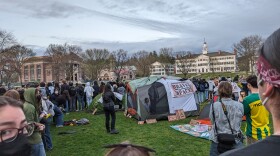The University of New Hampshire’s GRANIT mapping team will receive about a million dollars in state funds to create a database showing the availability of high speed internet access across the state down to individual addresses. The initiative is part of a $122 million federally funded program aimed at bolstering broadband accessibility nationwide.
Currently, officials only have general estimates for broadband access in New Hampshire: somewhere between 80-90% of all homes and businesses, according to Matt Laliberte, the director of the state’s Office of Broadband Initiatives.
By combining data and maps from the state’s 30 or so broadband providers, GRANIT will produce a far more accurate picture of those households and businesses where access is still limited, guiding future building efforts. Laliberte said getting those final rural communities the connectivity they need will bolster the economy.
“So that if you need to work from home, you have to have school from home, if you have to access telemedicine, that you have the bandwidth necessary to do those things reliably,” he said.
The Federal Communications Commission on Friday is also set to release a national broadband map. While some of the data in the map will be duplicated in New Hampshire’s map, set to be released in March, according to GRANIT, the state determined it made financial sense to also have a locally produced map that will be updated more frequently and will be catered to local data needs.
“You really want to make sure you can control your own process,” said Laliberte.
Older maps maintained by the state and federal government only provided connectivity information about entire census blocks, according to David Justice, the director of UNH’s GRANIT. While the state’s new dataset will drill down to individual addresses, that level of detail won’t be released to the public due to privacy concerns. Instead, public facing maps will be broken down into segments of roads.
In October, New Hampshire Electric Co-op was awarded $50 million through a competitive grant program to build out broadband service to approximately 23,000 households. On Friday, Gov. Chris Sununu sent a letter to a legislative committee urging them to support another $40 million round of spending for the Broadband Connect Program.








